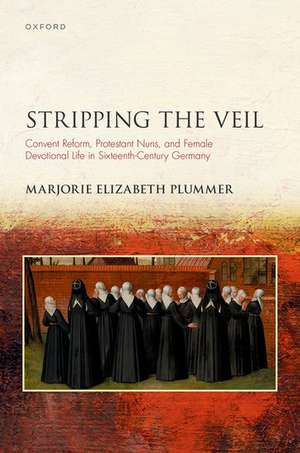Stripping the Veil: Convent Reform, Protestant Nuns, and Female Devotional Life in Sixteenth Century Germany: Studies in German History
Autor Marjorie Elizabeth Plummeren Limba Engleză Hardback – 24 mar 2022
Din seria Studies in German History
- 14%
 Preț: 690.86 lei
Preț: 690.86 lei - 28%
 Preț: 474.21 lei
Preț: 474.21 lei - 14%
 Preț: 691.62 lei
Preț: 691.62 lei - 30%
 Preț: 584.00 lei
Preț: 584.00 lei - 30%
 Preț: 497.19 lei
Preț: 497.19 lei - 25%
 Preț: 516.71 lei
Preț: 516.71 lei - 25%
 Preț: 582.93 lei
Preț: 582.93 lei - 14%
 Preț: 920.72 lei
Preț: 920.72 lei - 9%
 Preț: 249.75 lei
Preț: 249.75 lei -
 Preț: 225.08 lei
Preț: 225.08 lei - 17%
 Preț: 581.72 lei
Preț: 581.72 lei - 13%
 Preț: 645.95 lei
Preț: 645.95 lei - 25%
 Preț: 522.99 lei
Preț: 522.99 lei -
 Preț: 189.89 lei
Preț: 189.89 lei - 26%
 Preț: 559.65 lei
Preț: 559.65 lei - 23%
 Preț: 748.38 lei
Preț: 748.38 lei -
 Preț: 154.49 lei
Preț: 154.49 lei -
 Preț: 301.38 lei
Preț: 301.38 lei -
 Preț: 301.00 lei
Preț: 301.00 lei -
 Preț: 264.26 lei
Preț: 264.26 lei - 23%
 Preț: 749.64 lei
Preț: 749.64 lei - 23%
 Preț: 751.25 lei
Preț: 751.25 lei - 23%
 Preț: 750.76 lei
Preț: 750.76 lei - 15%
 Preț: 577.08 lei
Preț: 577.08 lei - 23%
 Preț: 753.11 lei
Preț: 753.11 lei - 17%
 Preț: 582.61 lei
Preț: 582.61 lei - 23%
 Preț: 744.71 lei
Preț: 744.71 lei - 23%
 Preț: 836.65 lei
Preț: 836.65 lei - 23%
 Preț: 753.18 lei
Preț: 753.18 lei - 23%
 Preț: 749.91 lei
Preț: 749.91 lei -
 Preț: 260.19 lei
Preț: 260.19 lei - 23%
 Preț: 749.32 lei
Preț: 749.32 lei -
 Preț: 258.66 lei
Preț: 258.66 lei -
 Preț: 533.14 lei
Preț: 533.14 lei - 23%
 Preț: 750.08 lei
Preț: 750.08 lei - 23%
 Preț: 835.31 lei
Preț: 835.31 lei - 23%
 Preț: 806.85 lei
Preț: 806.85 lei - 23%
 Preț: 749.77 lei
Preț: 749.77 lei -
 Preț: 264.82 lei
Preț: 264.82 lei - 23%
 Preț: 1002.27 lei
Preț: 1002.27 lei -
 Preț: 258.50 lei
Preț: 258.50 lei - 23%
 Preț: 749.32 lei
Preț: 749.32 lei -
 Preț: 261.93 lei
Preț: 261.93 lei - 23%
 Preț: 750.49 lei
Preț: 750.49 lei
Preț: 617.12 lei
Preț vechi: 699.88 lei
-12% Nou
Puncte Express: 926
Preț estimativ în valută:
118.08€ • 123.29$ • 97.73£
118.08€ • 123.29$ • 97.73£
Carte tipărită la comandă
Livrare economică 24-31 martie
Preluare comenzi: 021 569.72.76
Specificații
ISBN-13: 9780192857286
ISBN-10: 0192857282
Pagini: 372
Ilustrații: 39 black and white figures/illustrations
Dimensiuni: 162 x 243 x 26 mm
Greutate: 0.75 kg
Editura: OUP OXFORD
Colecția OUP Oxford
Seria Studies in German History
Locul publicării:Oxford, United Kingdom
ISBN-10: 0192857282
Pagini: 372
Ilustrații: 39 black and white figures/illustrations
Dimensiuni: 162 x 243 x 26 mm
Greutate: 0.75 kg
Editura: OUP OXFORD
Colecția OUP Oxford
Seria Studies in German History
Locul publicării:Oxford, United Kingdom
Recenzii
Plummer is able to tease out the diversity of convent reform, lending voice and agency to the women who negotiated for their communities and their selves.
Plummer's impressive text is accessibly structured, abundantly supported, and compellingly argued,...the book is invaluable. It should join the list of essential monographs in the field.
Stripping the Veil is a welcome contribution to a growing body of studies that expand understanding of the multifaceted ways in which nuns' interactions with the outside world contributed to their crafting of devotional practices, spaces, and identities.
Stripping the Veil asks what the development of mixed-confessional convents can reveal about how such houses were understood in the sixteenth century and argues that studying such houses and their histories can shed light on aspects of Reformation history that have been more widely studied.
Plummer's impressive text is accessibly structured, abundantly supported, and compellingly argued,...the book is invaluable. It should join the list of essential monographs in the field.
Stripping the Veil is a welcome contribution to a growing body of studies that expand understanding of the multifaceted ways in which nuns' interactions with the outside world contributed to their crafting of devotional practices, spaces, and identities.
Stripping the Veil asks what the development of mixed-confessional convents can reveal about how such houses were understood in the sixteenth century and argues that studying such houses and their histories can shed light on aspects of Reformation history that have been more widely studied.
Notă biografică
Marjorie Elizabeth Plummer is the Susan C. Karant-Nunn Professor of Reformation and Early Modern European History in the Division for Late Medieval and Reformation Studies at the University of Arizona. She is co-editor of the Archive for Reformation History and the author of From Priest's Whore to Pastor's Wife: Clerical Marriage and the Process of Reform in the Early German Reformation. She has been a James K. Cameron fellow at St. Andrews University, a Solmsen fellow at the University of Wisconsin Institutes for Research in the Humanities, a William D. Loughlin member at the Institute for Advanced Studies in Princeton, and guest professor in the Interconfessionality in Early Modern Period research group at the University of Hamburg.
